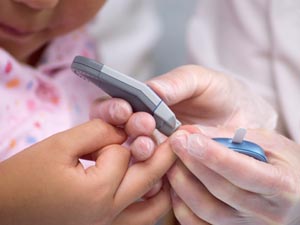Researchers at the University of Alabama at Birmingham (UAB) are investigating whether a non-digestible starch, delivered in the form of a tasty cookie snack, will reduce the risk of diabetes in women.

The study follows other research findings in men that indicate consumption of a non-digestible starch, called a resistant starch, improves insulin sensitivity. Insulin sensitivity refers to the body’s ability to use insulin to process glucose – or sugar – in cells.
Greater insulin sensitivity means a reduction in the risk of diabetes.
“Although the mechanism through which resistant starch benefits health is not entirely clear, it is possible that resistant starch affects the composition of the microorganisms in the digestive tract,” said Barbara Gower, Ph.D., professor in the Department of Nutrition Sciences in the UAB School of Health Professions. “Biochemicals produced by gut microorganisms are thought to have potentially beneficial health effects in humans. It is also possible that resistant starch slows the rate of nutrient absorption. This, in turn, may reduce the stress on the pancreas, resulting in improved ability to secrete insulin and reduce blood sugar.”
Gower is the primary investigator of the new UAB trial designed to determine if resistant starch, in the form of snack foods, improves insulin sensitivity in women, thereby lowering their risk for diabetes.
| Anyone interested in participating can get more information by calling 205-934-4386. |
UAB is recruiting 40 adult women, both pre- and post-menopause, for this study. Women in the study participate in three, four-week treatment periods over a 20-week period. Cookies that have various doses of resistant starch are consumed during each four-week treatment arm. Participants consume their own regular diet throughout the study, simply adding the cookies to their diet. Testing for insulin sensitivity is conducted at the end of each four-week treatment period.
Ingredion, provider of on-trend and in-demand ingredient solutions, is funding the study and supplying all of the snack foods. Outcomes are expected to provide basic information on the physiological processes that determine risk for chronic diseases such as diabetes and heart disease, as well as information regarding whether consumption of resistant starch products might be beneficial for disease prevention.
“Experience shows that most of us just don’t eat a healthy diet on a regular basis,” said Gower. “We want to see whether this could be an easy way to ‘clean up’ our diet, with something as simple as a starch supplement delivered through a cookie or other snack, and reduce the risk for diabetes.”
The prevalence of diabetes is skyrocketing in America, and it is especially high in the South. According to the Centers for Disease Control and Prevention, the incidence of diabetes has risen 140 percent in Alabama since 1995. Globally, there are 371 million people living with diabetes.
Compensation is provided for participants in the study. Anyone interested in participating can get more information by calling 205-934-4386.